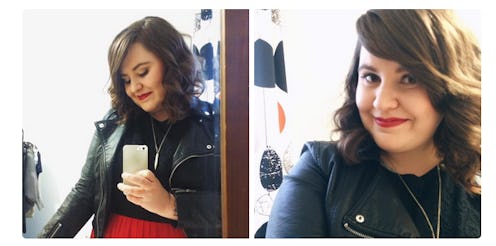Fashion
Looking At Selfies On Twitter Made Me Love Myself

One of the cheesy quotes that was often thrown around at the "spirit contemporary" church that I used to go to was Theodore Roosevelt's assertion that "comparison is the thief of joy." And when you're eating a salad whilst standing up at the counter between two jobs, simultaneously flipping through Instagram, that perfectly plated meal consumed at a set table that you scroll past can look enviable, sure. Of course, the numerous calls to increase transparency about the alterations to images and bodies in advertising and in the vast media argue that comparing the way that we look to models and celebrities can cause harm. But here's the part where I tell you that looking at pictures that gorgeous people on Twitter's hashtag #selfiearmy post doesn't spark comparison or jealousy or steal my joy. As a matter of fact, flipping through these selfies — babies to founder @princess_labia — makes me less self-conscious and more self-loving.
According to my endless scrolling through the hashtag on Twitter, it seems like the movement really took off in August of last year, and has amassed thousands of official and unofficial participants and their self-portraits ever since. Clicking through the thousands of photos, I spy my friends' faces and the faces of people who I've come to "know" over Twitter in the past few months — whose faces, at busy times, I tend to see more than those of my IRL friends. These are people whose selfies I favorite and re-Tweet, and whose own re-Tweeting of others' selfies I sometimes begin to emulate. I suppose there is just something about people feeling good enough about the way they look to share it with the whole Internet — and subsequently, the whole world — that makes me feel good.
My relationship to — and my feelings toward — selfies were once condescending at worst and neutral/indifferent at best. I obviously think it's important for people to feel the exact way they want to about the way they look (whether that's giving no F's about their appearance or going above and beyond with the NARS products to feel super positive about their faces). When selfies first became a thing, however, I became used to seeing celebrities or thin, blonde, white, cis, straight fashion bloggers throw these self-portraits all over social media. And the practice didn't necessarily feel worth celebrating. If anything, it was emblematic of the kind of selfie that can potentially lead to worse self-image.But when I first saw the self-portraits of people who weren't just mirror images of what dominant culture tells us is beautiful, I understood the potential relevance and power of being able to make yourself seen. Writer Kennedy Ryan (@kennedylryan) put it this way to me when we chatted via Twitter: "Selfies are important for everyone, but most of all they're important for marginalized people. Queer/fat/trans/genderfluid/racialized — and any intersections of that — because it allows them to see their own existence validated."
One of my favorite selfie-sharers, Rythima (@rythimhugh) explained to me the urge to share the selfies of other people and the delight in doing so: "When you get comfortable in taking selfies you become confident and start loving yourself... When you see someone else doing it, you just can't help but be excited and celebrate their self-love and happiness." I think this notion works both ways: When I'm having a bad body confidence day, seeing some selfies of proud women on Twitter (not to mention the positive responses of other users to those selfies) is extremely uplifting. Seeing people who are on that journey and feeling good about themselves, and sharing that goodness, is nothing less than inspiring. Because if belittling each other and pointing out the flaws of those around us simply to feel better about ourselves is the ultimate catty move, then sharing in someone else's brilliance and being able to tell them how beautiful and intelligent and wonderful they are is pure selflessness.
And it's not just the sharing of individual selfies or the selfies of one's Twitter fam that are so great, but the assertiveness with which they're shared. Captions like: "Show up to your mom's bday dinner looking hot as hell so everyone knows u r her #1 accomplishment," and, "I only make one face really but it's a damn good face," aren't apologetic or self-deprecating. Because there should be absolutely zero shame in finding yourself attractive, and these Twitter babes know it. So why do the rest of us act like that level of confidence is something appalling to own and showcase? The appalling thing that's really happeniing here — in this crazy society — is how we make girls and women perceive themselves as less-than-satisfactory humans when they dare to be confident. Digital strategist Nikita (@nikitaetmode) breaks it down for us:
When it comes to positive self-image, establishing media literacy and being able to deconstruct images (simply unplugging and consuming less images of other people's lives) are both things we should be doing on a regular basis. But actively encouraging other people's own self-image is just as, if not more, important — for them and for ourselves.
Images: Twitter; Selfie Army